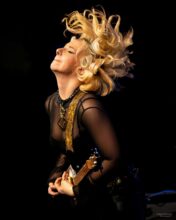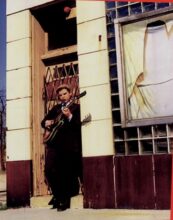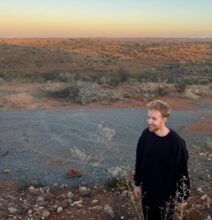Bonnie Raitt will return to Australia next month for her first ever appearance in Denilquin, NSW.

Bonnie Raitt - Photo By Ros O'Gorman
Bonnie will perform at the very first Deni Blues & Roots Festival over the Easter Long Weekend. “I have so many fans that stay in touch with me in between my tours in Australia, and we all really look forward to reconnecting,” she said in a recent Q&A.
Bonnie answered in the following questions in a lead-up to her tour.
1. How does this album differ from your previous releases?
Probably the most significant difference is that part of the album was produced by Joe Henry. I’m a big fan of his writing and albums and love the work he’s done producing Allen Toussaint, Solomon Burke, and others. I already had a couple of his songs I wanted to do and thought it would be great to call him and see if we might collaborate. Turns out, he was thinking the same thing and when we finally got on the phone, that first call lasted over two hours!
We found a couple of days when his usual players were available, including a new friend, the amazing Bill Frisell, with whom I’d been talking about working on something together. What started out as just an exploratory afternoon turned into two days and 8 tracks. It was so great to just show up and sing, play guitar a bit with these great musicians, not producing and just having fun. It really jumpstarted me wanting to get back in the studio with my guys and put down the songs I’d been culling for a while. Slipstream was off and running!
These early sessions also introduced me to the gifted engineer, Ryan Freeland, who did an amazing job integrating both the Joe sessions and the subsequent ones with my band.
For 8 of the songs, I used my usual longtime recording and touring band, now joined by the awesome keyboard/vocalist, Mike Finnigan.
As I’ve always drawn from such a wide variety of musical styles, each album is an opportunity to showcase a dozen new songs that I want to play, especially to have new material to take out on the road. I’m as thrilled with these and how the record came out as any album I’ve made.
2. Why ‘Slipstream?’ Are there particular themes or experiences that inspired the songwriting on this album?
I’m so inspired and proud to carry on the styles of music I love, whether it’s reggae or a James Brown feel, ballads or the blues. I’m in the slipstream of those who came before me and I’m creating one for those behind me as well.
As for themes, it’s more a process of finding songs that really speak to me at the moment. Which ones make it and how they fit together almost reveals itself more to me than the other way around. After all this time, it’s still a pretty mysterious process of intuition, luck and diligent searching more than anything plotted out.
3. Tell us about the first single – what is the story behind it and what does it mean to you?
I’ve always been a big Gerry Rafferty fan. I heard the song, “Right Down the Line,” come on the radio a few years ago and the guitar part just came to me like a lightning bolt. I love that nexus where reggae and rock meet, and this song gets right into it. Gerry was such a soulful and unique artist and I’m very sorry he passed before he could hear our version of his song.
4. This marks your longest period of time in between studio albums – what have you been up to over the last six years, and why was now the right time for you to release it?
Well, once the last album (Souls Alike, 2005) was out, we did a couple of years of touring, which also included recording some live tracks and interviews for an iTunes Originals album, the live DECADES Bonnie Raitt and Friends (Norah Jones, Ben Harper, Keb’ Mo’ and Alison Krauss) CD/DVD, a Crossroads CMT special with Lyle Lovett, and then another national summer/fall tour with Taj Mahal, called the BonTaj Roulet, in 2009.
During that time, my brother Steve, who’d been fighting brain cancer since 2001, unfortunately developed another tumor that seriously impaired his ability to care for himself. I took the time off to help oversee his care. He lost his fight in the spring of 2009 and soon after, one of my best friends also passed away. After the loss of my parents a few years before, and then this, I knew I needed to take some time to grieve and heal. I took a year-long hiatus from working on anything related to a new album or touring to find some balance in the other areas of my life. It was a very worthwhile and restorative time.
5. What have you been listening to since your last album? How do you think Bon Iver, Kelly Clarkson, and Adele’s covers of your songs have impacted your status with younger audiences?
I like to stay current with what my close pals are doing….Jackson Browne, Bruce Hornsby, Mavis Staples, Joe Henry, Maia Sharp, Paul Brady, Jon Cleary..and the host of singer/songwriters who either contact me or are longtime friends whose songs I’ve cut before. Al Anderson, Gary Nicholson, Paul Brady and Randall Bramblett are some I’ve covered before whose songs are on Slipstream. Some other artists who knock me out are Richard Julian, Sarah Siskind, Dayna B. Kurtz, Tony Scherr, and Terry Adams’ new NRBQ band.
I listen to a lot of old school jazz and blues, African, Indian and Celtic music and the scores of CDs and songs regularly sent to me for consideration on my new project.
As for Adele, Justin (Bon Iver) and Kelly covering “I Can’t Make You Love Me,” I couldn’t be more thrilled and honored. I’m a big fan of all three and really enjoyed connecting with Justin when they played a show in L.A. this past summer. There’s so much great music out there now, especially in the Americana format I tend to listen to. I’m really happy with the success of the Black Keys and some others that show real artistry and innovation. It’s great to hear so many young artists influenced by the same classic soul, blues, jazz and rock that means so much to me.
6. The album includes Bill Frisell and Loudon Wainwright, among others – what did their respective backgrounds and styles bring to the project?
I had been a fan of Bill’s since first hearing about him many years ago. So eclectic, inventive and soulful in all he does. I didn’t get to meet him until I became friends with bassist Tony Scherr, who was part of that whole Lower East Side of NY music scene Richard Julian introduced me to a few years ago. Tony has played with Bill (and is one of my favorite solo artists/guitarists as well) for years and he introduced us and we both expressed hope that we could work together one day soon.
When Joe and I decided to try some things, we worked around Bill’s touring schedule and I was just knocked out to play with him. He’s so unique, so sensitive to the song and other musicians; it’s like he’s painting with sound. And one of the nicest people you’ll ever meet. A real honor for me.
Loudon and I came up nearly the same time in the early 70’s and I remember playing the Gaslight and seeing him down the street at the Bitter End in Greenwich Village. I’ve loved and admired his brilliance ever since.
“You Can’t Fail Me Now” was the first song of Joe’s I knew I wanted to cut. I found out later that it was co-written by Loudon. Two great writers and it shows in this song. The melody and lyrics are as stunning as any I’ve sung. Loudon wrote to tell me how much he loved my version and it’s one of my favorites on the album.
7. Where did you record, and how did that impact the album?
We did the first round of sessions produced by Joe Henry at Joe’s studio in his home, the Garfield House, in South Pasadena. It was a very intimate and warm setting, captured so well by our gifted engineer, Ryan Freeland, who was right in the room with us. You can feel immediately why their records sound so special. The songs came so effortlessly, we just kept going. I’m planning to release the other tracks from Joe’s on Redwing down the line.
The second round was at the legendary Ocean Way Studios in Hollywood, where I recorded some of my big albums back in the ’90s. I brought in my longtime band, and special guest Al Anderson on 3 of his tunes. We had a ball for those two weeks cutting these great new songs I’d been culling the last few years.
Once the tracks were cut, Ryan and I did the overdubs and mixing at his Stampede Origins home LA studio.
It was a bit daunting to figure out how to integrate the two very different sessions into one album. Once I got a sequence of songs I thought would work, Ryan, having recorded both bands, was able to piece it together so seamlessly. He is a truly remarkable engineer and such a great hang.
8. What do you hope that listeners will take away from the album?
I hope they’ll be as knocked out by these new songs and the playing as I am. I love letting folks know about these often overlooked gems. I’m as proud of this record as any I’ve made.
9. What was the inspiration to create your own label, and what has been the biggest change?
You know, we did a lot of research on the different options for a legacy artist like myself in this very different music business of today. We were lucky to have some great offers by some respected labels and any of them I’m sure would have worked very well. When all was said and done, after talking to Jackson Browne and some others who’ve gone their own way, we decided to move forward with Redwing Records. I couldn’t have even considered it without having my incredible management team, Kathy Kane and our staff. There’s so much coordination done by management anyway, we knew that if we assembled the best distribution (RED in North America and Proper Records for Ex-NA) and PR team (Shore Fire Media) we could really get the job done and have a lot of control and transparency.
I think the biggest change is how streamlined and customized our efforts are – we’ve had incredible success this year because of this team effort. The narrowed focus of being the only artist on a label helps with that transparency and control and we know these folks are passionate and aren’t being pulled in so many directions.
With the terrific critical response to ‘Slipstream’ and the residual affection and loyalty of fans, it’s been much easier than an artist starting from the ground up. With a poorly-received album, none of this would have happened as smoothly, independent or major. But like making a good record, getting the right people in place beforehand is the ticket has enabled me to be more free and concentrate on doing press, making decisions about singles, and continuing to do the best shows I can possibly do out on the road.
10. If you were breaking into the business today, do you think it would be easier or more difficult than it was 40 years ago?
I think that without the vibrant network of coffee houses and the college circuit, and the fewer number of new artists that characterized the early 70s, it might be harder. That said, getting the word out through YouTube and finding new ways to build buzz makes it a draw.
There are more inexpensive, populist routes to getting your music and image out through the internet and indie labels and blogs, but wading through the explosion of new artists from nearly format of music trying to break through is challenging.
The other way is to try and get through to whomever signs new artists to indie labels or management – filtering those thousands of submissions is what A&R people and print journalists used to do – but with those options narrowing and disappearing, you’re more at the mercy of luck and who you know.
11. On returning to Australia…
I have so many fans that stay in touch with me in between my tours in Australia, and we all really look forward to reconnecting. I’m excited to play the new songs for them and get to have time to explore these great cities and countryside. I only wish we could get to more cities and have more time off. But we’re all excited to get back and play these wonderful festivals and concert halls.
Visit the Deni Blues & Roots Festival site for tickets.
Stay updated with your free Noise11 daily music newsletter. Subscribe to Noise11 Music News here

















